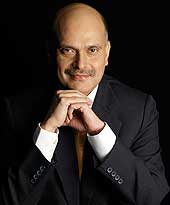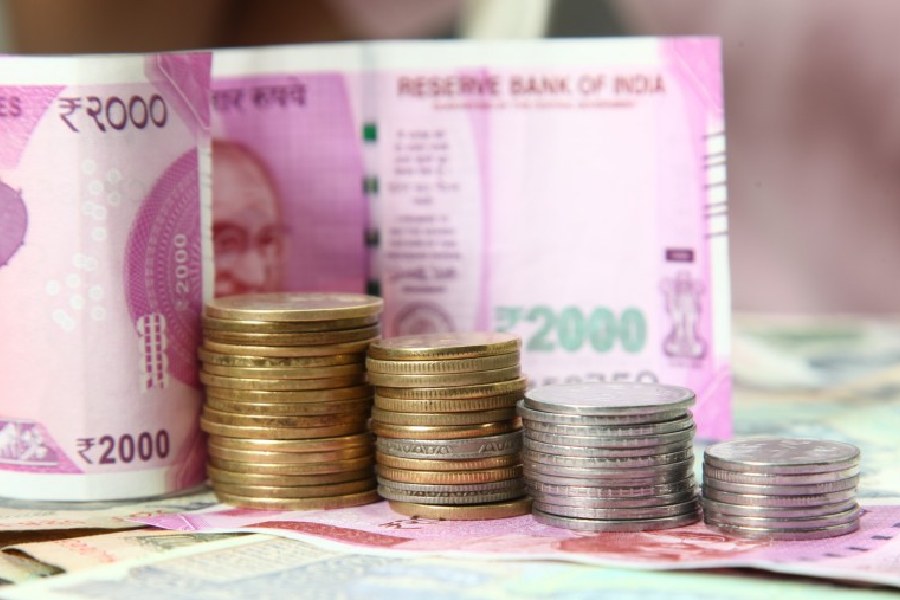 |
In 1999, a fire destroyed the offices of TV 18 in Kalkaji, New Delhi. Raghav Bahl, managing director, promoter and prime mover of the company, immediately ordered the entire operation to be shifted to his own home. “There was no other place,” says Bahl. “We didn’t want to miss broadcasting even for a day. Everybody worked overtime to set up the studio and CNBC TV 18 went on air with its programme as usual.”
That can-do, come-let’s-beat-the-odds spirit characterises Raghav Bahl as nothing else does. The 44-year-old businessman and sometime television anchor has powered TV 18 from its somewhat rocky beginnings to such a position of strength that today it is considered one of the foremost players in India’s burgeoning media space.
Sitting in TV 18’s swank offices in Noida on the capital’s outskirts, Bahl — dapper and urbane — looks pleased with the way things are shaping up for his company. And with good reason. With four 24-hour news channels under its belt — CNBC TV 18 (English business news), CNN IBN (English general news), CNBC Awaaz (Hindi business news), and IBN7 (Hindi general news) — TV 18 now occupies the top spot in the television news category in terms of the number of channels. That’s not all. According to the latest TAM viewership ratings, CNN-IBN, launched just a year ago, has raced ahead of its other competitors and is now running neck-and-neck with NDTV 24X7, the stalwart in the English news space. CNBC TV 18 and CNBC Awaaz too are clear leaders in the English and Hindi business news categories, respectively.
Bahl is a bit of an enigma in the media. He maintains a low profile, and few outside the industry connect TV 18 with this man with a heavily receding hairline. There are those who call him ruthless and autocratic, and some say that he is by no means an easy person to work with. But Bahl has little time for such criticism: there is, after all, an empire to be run.
Indeed, these are heady days for the entire TV 18 group. The company is on a brisk expansion mode, foraying into a plethora of media spaces like film production, e-recruitment, e-travel and e-commerce. Earlier this year, it picked up a majority stake in JobStreet.com, it has a strategic stake in the travel portal Yatra Online and has several other Web businesses, including its flagship portal moneycontrol.com. Apart from ramping up its presence on the Web, the group is set to launch a home shopping channel on television this month. It even acquired wire agency Crisil MarketWire last month to get a foot into the data terminal business.
So how does it feel to have transformed TV 18 from a single channel unit less than 18 months ago to what is now a fast-growing media conglomerate straddling news broadcast, Internet platforms and the entertainment business? “Good,” says Bahl, with a smile. “But you have also got to remember that these are extremely opportune times — I call it the gold prospecting times of the Indian economy. So you’ve got to be paranoid about your growth, you’ve got to move very fast, otherwise you’ll miss out on opportunities.”
That shouldn’t worry Bahl much, for he’s always had the knack of seizing Fortuna by the forelock, as it were. The economics honours graduate from St Stephen’s College, Delhi, who dabbled in Doordarshan’s brand of television from his college days, was quick to see the colossal and hitherto unimagined opportunities that satellite television offered. “When satellite TV came to India in 1991, it was very clear to me that this was a huge force that was here to stay and that we would need local content to feed it,” says Bahl.
That was when he decided to embrace the media business full time. In 1993, he set up TV18 — “18” is a lucky number for him, he reveals — along with a co-promoter named Sanjay Roy Choudhury, who is on the company’s board even today. Bahl’s only investment in the venture was the Rs 50,000 that he had drawn from his savings bank and which went into the making of the pilot projects for India Business Report and The Amul India Show which TV 18 did for BBC World and Star, respectively.
India Business Report on BBC, the weekly show that Bahl anchored himself, went on to become a success. But he soon realised that it was simply not enough to be a provider of content — the way forward lay in broadcasting. The leap of faith, from content producer to broadcaster, came when the Singapore-based Asia Business News (ABN), a Dow Jones company, offered TV 18 a broadcasting partnership in 1995. “Not many people realise that we were the first television producer to become a broadcaster,” says Bahl.
The journey so far hasn’t been all smooth sailing, though. There have been hurdles on the way and crises that have loomed up and threatened to knock the bottom out of what was then a fledgling media enterprise. One such critical moment came in 1998 when ABN merged with CNBC. “The joint venture between TV 18 and ABN came to an end and CNBC TV 18 was born, where we became a brand and corporate franchisee of CNBC,” says Bahl. Had that deal not materialised, TV 18 would have been in dire straits and left with huge losses as it simply did not have the wherewithal at the time to become an independent broadcaster.
Today, sitting atop a Rs 300-crore media empire, Bahl is fairly gung-ho about the prospects of India’s electronic media. The coming of the Conditional Access System (CAS), direct-to-home (DTH) television and Internet Protocol TV (IPTV) will, he feels, energise and transform the medium like never before. “As I see it, there have been three waves in Indian television,” says Bahl. “The first was when satellite TV came in. The second took place when cable TV reached 40 to 50 million households and we moved from omnibus channels to niche and special interest channels like music, sports, etc. Now we are witnessing the third wave where, because the government is allowing competitive forces to enter the market by way of CAS, DTH, IPTV, etc, our industrial structures will finally begin to approximate global structures.”
A spin off of that could be greater revenues flowing in from the distribution end of the business. At present 90 per cent of the revenues of Indian TV channels come from advertising although globally, the share is about 50 per cent from ads and 50 per cent from distribution. “I am not being so bullish as to claim that we’ll double our revenues as a result. But it will happen by and by,” he says.
As far as his own channels are concerned, Bahl is confident that IBN7, which is the only laggard in the TV 18 pack, will fight hard to take on the challenge in the fiercely competitive Hindi news space. And the next move would be to venture into regional channels. “That’s the logical step forward,” he says, although he refuses to divulge any details on that front.
Bahl’s associates call him a “visionary” — a man who can read the future and reap its promises. Those who have fallen out with him claim that he can be ruthless when he wants to be. But, clearly, everybody admires his ability to lead from the front. Says Paranjoy Guha Thakurta, director, School of Convergence, Delhi, and a former anchor on CNBC TV 18, “He has a tremendous ability to enthuse people.” Adds Malvika Singh, publisher of the monthly magazine Seminar and Bahl’s colleague in India Business Report in the early 1990s, “He is extremely hardworking and has a professionalism that is rare in the television industry. He may have strong opinions but he is not opinionated.”
His professionalism and the way he has instilled it into the ethos of his channels is something that Ashish Kapoor, a Delhi-based stock market analyst, also admires. “His marketing skills and his ability to grow aggressively are to be emulated,” says Kapoor.
Today, Bahl is content to step back and let the few good men and women who run his channels and businesses take the group forward. He believes in the mantra that unless you vacate spaces and empower people, they will not deliver and the organisation will suffer as a result. “I used to be completely hands-on in the 1990s. But now I am there more as a friend, philosopher and guide. I am involved with all the strategic decisions of the company, but operationally, our CEOs and editors have an absolutely free hand.”
That is perhaps why he gets to spend more time with his family — his wife, his 11-year-old daughter and five-year-old son. But though he may not be physically in office for long hours, he admits that thanks to technology, he ends up being “engaged” with his work close to 15 hours a day.
“I consider myself an intellectual entrepreneur,” says Bahl. “What attracted me to the media business in the first place was that the product was intellectual and that it had tremendous entrepreneurial possibilities.” Bahl has certainly made good many of those possibilities. But as he’d be quick to tell you, the best is probably yet to be.
Growth story
TV 18’s New Ventures
![]() Launched a new company, Studio 18, earlier this year to foray into the motion picture business.
Launched a new company, Studio 18, earlier this year to foray into the motion picture business.
![]() In April 2006, picked up a majority stake in e-recruitment portal JobStreet.com.
In April 2006, picked up a majority stake in e-recruitment portal JobStreet.com.
![]() In November 2006, announced the acquisition of wire agency Crisil MarketWire.
In November 2006, announced the acquisition of wire agency Crisil MarketWire.
![]() In November 2006, signed an exclusive distribution deal with Australian Broadcasting Corporation (ABC) to bring its free-to-air infotainment channel Australia Network to cable homes in the country.
In November 2006, signed an exclusive distribution deal with Australian Broadcasting Corporation (ABC) to bring its free-to-air infotainment channel Australia Network to cable homes in the country.
![]() A home shopping TV channel to be launched later this month.
A home shopping TV channel to be launched later this month.
![]() Plans to launch regional channels.
Plans to launch regional channels.










